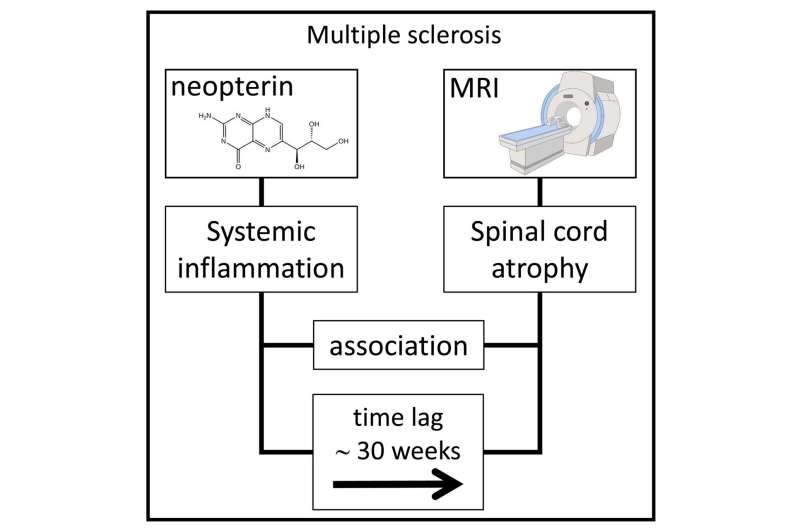This article has been reviewed according to Science X's editorial process and policies. Editors have highlighted the following attributes while ensuring the content's credibility:
fact-checked
peer-reviewed publication
trusted source
proofread
Multiple sclerosis progression linked to immune response outside the brain

New research, led by the University of Southampton and University Hospital Southampton, shows that inflammation outside the brain, such as that caused by common infections such as colds and urine infections, is linked to the progression of multiple sclerosis (MS).
The Systemic Inflammation in Multiple Sclerosis (SIMS) study followed 50 people living with progressive forms of MS for two and a half years. Researchers measured inflammation in the body by looking at a weekly urine sample. This inflammation can be caused by a number of factors, including infections, other medical conditions, trauma and an unhealthy lifestyle.
The research is published in the journal Brain Communications.
MS is caused by the immune system mistakenly attacking the nerves in the brain and spinal cord. Over time, this can lead to the loss of nerves, which causes MS progression. Research in animals has shown that inflammation outside the brain can exacerbate this process, but researchers wanted to understand whether this happens in people with MS.
The study also builds on previous research which has found that infections can sometimes trigger a relapse or temporary worsening of symptoms in MS. This new study suggests that inflammation, which can be caused by infections like colds, flu and UTIs (urinary tract infections), is linked with the loss of nerve cells in the spinal cord—which is a major underlying cause of MS progression.
Professor Ian Galea, neurologist from the University of Southampton and lead researcher on SIMS says, "Our results build on decades of research showing inflammation causes nerve cell loss in the laboratory. Now we've shown a connection between inflammation and loss of cells in the spinal cord in humans.
"And in the future, lab research could help us understand what's going on at a molecular level when this inflammation happens—which could perhaps help us develop new drug treatments.
"The results of this study suggest it is important for people with MS to minimize inflammation where they can. This includes receiving all recommended vaccinations and seeking prompt attention for bladder infections.
"Following a healthy lifestyle could also be beneficial, as factors like smoking, alcohol and obesity are linked to inflammation. And as health care professionals, we can help too by talking about these things with our patients so they have the facts they need."
More than 150,000 people live with MS in the U.K., with 135 diagnosed each week. The condition affects the brain and spinal cord, impacting how people move, think and feel. Symptoms are different for everyone, but can include fatigue, pain, vision problems and mobility issues. Most people are diagnosed in their 30s or 40s, but it can affect people of all ages, ethnic backgrounds and genders.
One of the study's participants was Richard Humpston (43), from Portsmouth, who was diagnosed with primary progressive MS in 2014. Richard is now medically retired, but he previously worked within the NHS on a neurological rehabilitation ward. His symptoms include difficulty with walking and bladder issues.
Richard says, "I participated in the SIMS study, which meant freezing my urine every week and going into hospital for various tests and check-ups. I was told afterwards that there was some evidence that I had urine infections during the study.
"The results of this trial have highlighted how vital it is for me to stay hydrated to avoid this type of infection in future. And it also makes me realize how important it is to know the signs and symptoms of having a UTI, and to get help as soon as possible for any infection.
"For me, getting involved in research is all about making things better for people in the future and making sure we have a better understanding about what MS is. When I was first diagnosed there were no disease modifying treatments (DMTs) at all for people with my type of MS, but now I'm on a licensed DMT which has improved my life—thanks to research, we've already made so much progress."
Dr. Clare Walton, Head of Research at the MS Society, says, "This study gives us vital insight into the relationship between inflammation outside the brain and MS progression. We know that bladder infections in particular are very common for the 150,000 people who live with MS in the U.K. This research highlights how important it is for people with MS to recognize the symptoms and seek help early for urinary infections, and to take up any vaccinations they are eligible for.
"The findings also demonstrate the need for access to good and timely primary care, with GPs who understand the risk of infections and MS progression. And we need to see improved waiting times for specialist services like urology for people with MS experiencing urinary problems and repeat UTIs."
More information: Charlotte M Stuart et al, Systemic inflammation associates with and precedes cord atrophy in progressive multiple sclerosis, Brain Communications (2024). DOI: 10.1093/braincomms/fcae143



















